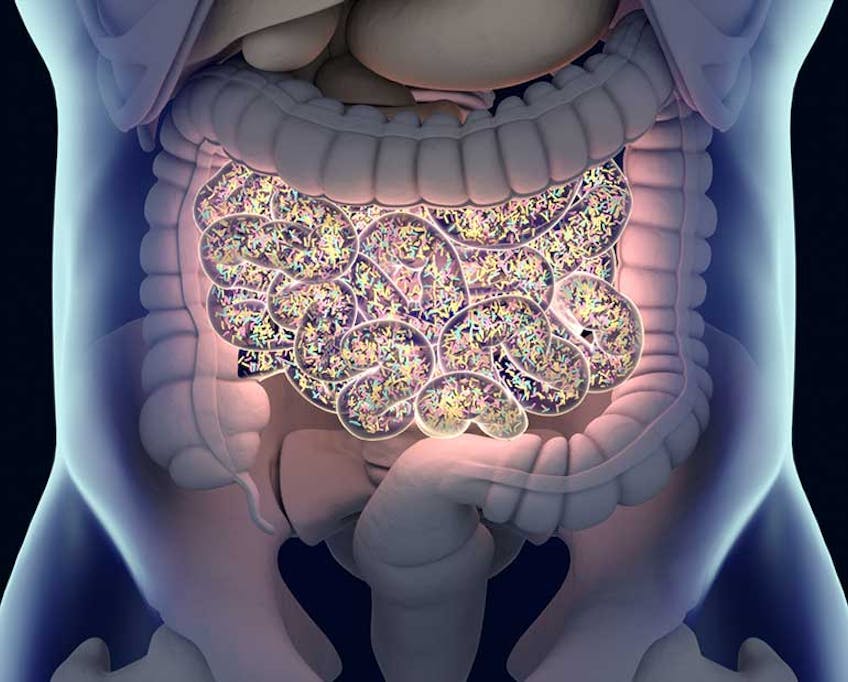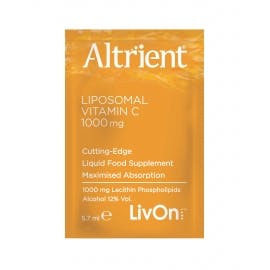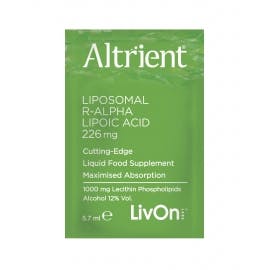Transform your gut health with Vitamin C and R-Alpha Lipoic Acid…
Is your gut health making you miserable? Time to optimise the health of your digestive system with Altrient Liposomal Vitamin C and Altrient R-Alpha Lipoic Acid (ALA). These two dynamic nutrients are key players in the fight against inflammation - universally recognized as one of the key factors for many chronic conditions affecting the gastrointestinal tract.
Gut health today
Inflammatory Bowel Disease (IBD), which includes Crohn’s disease and ulcerative colitis, is currently the second most common inflammatory disorder after rheumatoid arthritis and affects five million people worldwide. Irritable Bowel Syndrome (IBS) has also been identified as an inflammatory gut health issue that affects as many as 3.5 million in America alone.
A long list of symptoms including abdominal pain, wind, constipation, fatty stools, fever and diarrhoea, make daily life extremely challenging for sufferers of these debilitating conditions. Thankfully there are many therapeutic solutions to help with symptom management and shoring up your inflammatory defenses with vitamin C and ALA is a great place to start.
Tell-tale signs of inflammation
Inflammation occurs when your immune system responds to harmful agents, such as germs, injuries or chemicals and radiation. Your body works hard to remove the problem by protecting the surrounding tissue and initiating a healing process with associated pain, swelling, heat and redness – all typical signs of inflammation.

Acute inflammation is an effective mechanism in the fight against an assault on the body, however if it becomes too pronounced or persistent it can result in an abnormal state of chronic inflammation.
What causes chronic inflammation?
Scientific evidence suggests that factors such as elevated oxidative stress, ineffective immune response, imbalance in gut bacteria, pollution, smoking, stress, poor diet, lack of exercise and genetics all influence inflammation.
The important role of antioxidants
Inflammation and oxidative stress are closely related and linked with a number of chronic diseases such as IBD and IBS. Antioxidants are vital for protecting cells from the damage caused by oxidative stress which triggers inflammation. Antioxidants are found in living tissue and the cells of the body and are sourced from the food that we eat.
Antioxidant rich foods
Unfortunately, the antioxidants found in meat, milk and eggs are destroyed by cooking or broken down in the digestive tract. Fruit and vegetables on the other hand contain antioxidants that are more likely to survive the cooking process and are generally well absorbed, which is why we are constantly reminded to eat a diet rich in fruit and vegetables.
However, reaching government recommendations for daily fruit and vegetables is not always achievable increasing your risk of developing a deficiency in vitamin C and ALA. Since these two nutrients are so important for countering oxidative stress, supplementation may help to fill the nutritional gap.
Protection with vitamin C
Vitamin C has long been considered a key cellular antioxidant. Even in small amounts the powerful antioxidant activities of vitamin C can help prevent inflammation in the gut by protecting indispensable molecules in the body from free radical damage. Vitamin C is an unstable water-soluble nutrient that is hard for the body to absorb. Most regular supplements are often broken down in the stomach and are largely eliminated as waste. Choosing a next generation vitamin C supplement such as Altrient Liposomal Vitamin C helps ensure maximised absorption and speedy transport all the way to your cells where you need it most.
What’s more, in addition to its direct antioxidant effects it has the ability to regenerate other important antioxidants such as vitamin E and glutathione. Both offer additional anti-inflammatory protection. Vitamin C also participates in several other important functions that support the blood vessels and epithelial cells that line the gut by
supporting the production and deposition of collagen in the basement membrane, (which anchors together the layers of the intestines).
encouraging the proliferation of cells that line the blood vessels
reducing cell death
helping regulate blood flow to the area
These functions help to keep the intestinal barrier strong and healthy, which prevents pathogenic bacteria from infiltrating and triggering inflammation. Impairment of this vital barrier accompanied by a leaky gut is understood to be a key step in the initiation and development of IBD.
Alpha Lipoic Acid for improved antioxidant defence
ALA is a particularly impressive antioxidant because it functions in both fat and water-soluble solutions allowing it to work throughout the entire body. Oral doses of ALA are rapidly absorbed and several studies have shown that supplementing with ALA significantly reduces markers of inflammation in various chronic gut health conditions. It’s advisable to opt for a high-quality liposomal ALA such as Altrient R-Alpha Lipoic Acid which utilises technology to deliver maximised absorption. Emerging research has identified the benefits of ALA for use in IBD. One study has shown that ALA has a protective effect against the oxidative injury found in colitis. ALA was seen to protect tissues in the colon because of its antioxidant and membrane stabilizing properties.
DHLA a counterpart of ALA also directly regenerates vitamin C, vitamin E and glutathione which enhances the body’s anti-inflammatory mechanisms and aids detoxification and elimination of toxins that may promote inflammation further.
Remember your body has an enormous capacity to heal itself if you take the necessary steps and provide good levels of essential anti-inflammatory nutrients such as liposomal vitamin C and liposomal Alpha Lipoic Acid.
Author: Jacqueline Newson BSc (Hons) Nutritional Therapy
REFERENCES
Abdollahi PP et al. Effects of Alpha-Lipoic Acid Supplementation on Inflammation, Oxidative Stress, and Serum Lipid Profile Levels in Patients With End-Stage Renal Disease on Hemodialysis. Journal of Renal Nutrition 2012, 2 (22): 244-250.
Abreu MT, Kais S, Knight-Sepulveda K and Santaolalla R. Diet and Inflammatory Bowel Disease. Gastroenterology and Hepatology. 2015; 11(8): 511-520.
Akbari M, Ostadmohammadi V, Tabrizi R, et al. The effects of alpha-lipoic acid supplementation on inflammatory markers among patients with metabolic syndrome and related disorders: a systematic review and meta-analysis of randomized controlled trials. Nutr Metab (Lond). 2018;15:39.
Biswas S K. “Does the Interdependence between Oxidative Stress and Inflammation Explain the Antioxidant Paradox?,” Oxidative Medicine and Cellular Longevity, 2016; 5698931: 1-9.
Cetinel S et al. Protective Effects of Alpha-Lipoic Acid Against Oxidative Injury in TNBS-induced Colitis. Erciyes Medical Journal 2009; 31(1):015-026.
Domschke W, Heidemann J, Kucharzik T and Maaser C. Intestinal Microvascular Endothelium and Innate Immunity in Inflammatory Bowel Disease: a Second Line of Defense? Infection and Immunity 2006; 74 (10) 5425-5432.
Doomra M, Narasimhulu CA Naser S, Parthasarathy S, Rohr M and Sharma D. Inflammatory Diseases of the Gut. J Med Food. 2018; 21(2):113-126.
http://www.crohnscolitisfoundation.org/news/for-the-media/media-kit/fact-sheet-about-ibd.html. [accessed 14.10.18].
https://www.nhs.uk/conditions/inflammatory-bowel-disease [30.10.18].
International Foundation For Gastrointestinal Disorders. About IBS. https://www.aboutibs.org/facts-about-ibs/statistics.html. [accessed 4.11.18]
Kalluri R, LeBleu VS, Macdonald B. Structure and function of basement membranes. Exp Biol Med (Maywood). 2007;232 (9):1121-9.
Moura FA, de Andrade KQ, dos Santos JC, Araújo OR, Goulart MO. Antioxidant therapy for treatment of inflammatory bowel disease: Does it work? Redox Biol. 2015;6:617-39.
PubMed Health. What is Inflammation. https://www.ncbi.nlm.nih.gov/pubmedhealth/PMH0072482/ [accessed 14.10.18]



.jpg?auto=format&q=45&w=262&trim=auto)
.jpg?auto=format&q=45&w=262&trim=auto)
